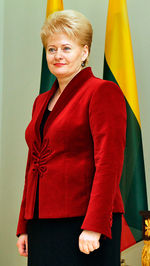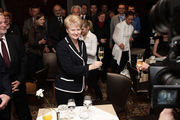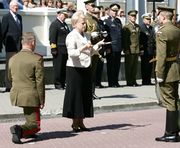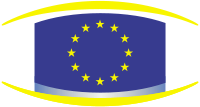Dalia Grybauskaitė
| Dalia Grybauskaitė | |
 |
|
|
13th President of Lithuania
|
|
| Incumbent | |
| Assumed office 12 July 2009 |
|
| Prime Minister | Andrius Kubilius |
|---|---|
| Preceded by | Valdas Adamkus |
|
European Commissioner for Financial Programming and the Budget
|
|
| In office 22 November 2004 – 1 July 2009 |
|
| President | José Manuel Barroso |
| Preceded by | Michaele Schreyer Marcos Kyprianou (Budget) |
| Succeeded by | Algirdas Šemeta |
|
European Commissioner for Education and Culture
|
|
| In office 1 May 2004 – 11 November 2004 Serving with Viviane Reding |
|
| President | Romano Prodi |
| Preceded by | Viviane Reding |
| Succeeded by | Ján Figeľ (Education, Training, Culture and Multilingualism) |
|
|
|
| Born | 1 March 1956 Vilnius, Soviet Union (now Lithuania) |
| Alma mater | Zhdanov University Edmund A. Walsh School of Foreign Service |
| Profession | Political economist |
| Religion | Roman Catholicism |
| Signature | |
Dalia Grybauskaitė (pronounced [ˈdaːlʲæ ɡʲrʲiːbɒʊsˈkaɪtʲeː], born 1 March 1956) is a Lithuanian politician and the current President of Lithuania inaugurated on July 12, 2009. She was previously Lithuania's Vice-Minister of Foreign Affairs, Finance Minister, and European Commissioner for Financial Programming & the Budget. Often referred to as the "Iron Lady", Grybauskaitė is Lithuania's first female head of state.
Contents |
Early years
Dalia Grybauskaitė was born on 1 March 1956 into a working-class family in Vilnius. Her mother, Vitalija Korsakaitė (1922–1989), born in the Biržai region, worked as a saleswoman; her father, Polikarpas Grybauskas (1928–2008) worked as an electrician and as a driver. Grybauskaitė attended Salomėja Nėris High School. She has described herself as not among the best of students, receiving mostly fours in a system where five was the highest grade. Her favorite subjects were history, geography and physics.[1]
She began participating in sports at the age of eleven, and became a passionate basketball player.[1] At the age of nineteen she worked for a year at the Lithuanian National Philharmonic as staff inspector. She then enrolled in Saint Petersburg State University, then known as Zhdanov University, as a student of political economy.[2] At the same time she began working in a local factory. In 1983 Grybauskaitė graduated with a citation and returned to Vilnius, taking a secretarial position at the Academy of Sciences. Work in the Academy was scarce, however, and she moved to the Vilnius Party High School, where she lectured in political economy and global finance.[2] Between 1983 and 1990 she was a member of the Communist Party of the Soviet Union. In 1988 she defended her Ph.D thesis at Moscow's Academy of Social Sciences of the Central Committee of the Communist Party of the Soviet Union (now the Russian Academy of State Service).
In 1990, soon after Lithuania re-established its independence from the Soviet Union, Grybauskaitė continued her studies at the Georgetown University (Washington DC) School of Foreign Service in the Special Program for senior executives.[3]
Early career
Between 1991 and 1993 Grybauskaitė worked as Director of the European Department at the Ministry of International Economic Relations of the Republic of Lithuania. During 1993 she was employed in the Foreign Ministry as director of the Economic Relations Department, and represented Lithuania when it entered the European Union Free Trade Agreement. She also chaired the Aid Coordination Committee (PHARE and the G-24). Soon afterwords she was named Extraordinary Envoy and Plenipotentiary Minister at the Lithuanian Mission to the EU.[3] There she worked as the deputy chief negotiator for the EU Europe Agreement and as a representative of the National Aid Co-ordination in Brussels.
In 1996 Grybauskaitė was appointed Plenipotentiary Minister in the United States's Lithuanian embassy. She held this position until 1999, when she was appointed deputy Minister of Finance. As part of this role, she led Lithuanian negotiations with the World Bank and International Monetary Fund. In 2000, Grybauskaitė became Vice Minister of Foreign Affairs, going on in 2001 to become Minister of Finance in the Algirdas Brazauskas government. Lithuania joined the European Union on 1 May 2004, and Grybauskaitė was named a European Commissioner on the same day.[2]
European Commission
Grybauskaitė initially served as European Commissioner for Education and Culture. She held this position until 11 November 2004, when she was named European Commissioner for Financial Programming and the Budget within the José Manuel Barroso-led Commission.
In November 2005 Dalia Grybauskaitė was named "Commissioner of the Year" in the European Voice Europeans of the Year poll. She was nominated "for her unrelenting efforts to shift EU spending towards areas that would enhance competitiveness such as research and development." She commented:[4]
I don't usually participate in contests, so this is a very pleasant surprise for me. I consider it a distinction not for me personally, but for all the new EU Member States, both small and large, as an acknowledgment of their bringing a new and fresh perspective to the EU. I think that it’s also a prize for having the courage to speak the often difficult truth and to point out the real price of political rhetoric in Europe. As for results, we still have to wait for them. An agreement on the budget for 2007–2013, which Europe really needs, is most important.
As Financial and Budget Commissioner, she strongly criticized the EU budget, stating it was "...not a budget for the 21st century."[5] The majority of the EU budget was spent on agricultural programs. Grybauskaitė presented a 2008 EU budget in which, for the first time in its history, spending on growth and employment constituted the highest share of the budget, exceeding that of agriculture and natural resources.[6] She frequently criticized the Lithuanian Government, headed by Prime Minister Gediminas Kirkilas, for its lack of response to the approaching financial crisis.[7]
2009 presidential elections
"The taste of victory is the burden of responsibility."
-
- on being the first woman elected President of Lithuania[8]
On 26 February 2009, Grybauskaitė officially announced her candidacy for the 2009 presidential election. In her declaration speech, she said:
I decided to return to Lithuania if the Lithuanian people decide I am needed there now. I think that we all long for the truth, transparency and responsibility for our country. We all want to live without fear, with confidence in ourselves, in each other, and in tomorrow.I can and I want to contribute with my experience, knowledge and skills to expel shadows from morality, politics, and economics to create a citizen-ruled Lithuania - a state of citizens. Therefore, I will run for the Lithuanian presidency.[9]

Opinion polls taken in February 2009 showed that Grybauskaitė was the undisputed leader in the race.[10] She ran as an independent, although she was supported by the dominant Conservative Party as well as by NGOs, including Sąjūdis.[11][12]
Her campaign was primarily focused on domestic issues. After years of strong economic growth, Lithuania faced a deep recession with double-digit declines in economic indicators. The unemployment rate rose to 15.5% in March, and a January street protest against the government's response to the recession turned violent.[13] During the campaign, Grybauskaitė stressed the need to combat the financial troubles by protecting those with the lowest incomes, simplifying the Lithuanian bureaucratic apparatus, and reviewing the government's investment program.[14] She also promised a more balanced approach in conducting foreign policy, the primary constitutional role of the Lithuanian presidency.

The election was held on 17 May 2009. Dalia Grybauskaitė won in a landslide, receiving 68.18% of the vote.[15] The 51.6% turnout was just above the threshold needed to avoid a runoff election.[16] In winning the election, Grybauskaitė became not only the first female president of Lithuania, but won by the largest margin recorded in presidential elections.[17]
Political analysts attributed the easy victory to Grybauskaitė's financial competence and her ability to avoid domestic scandals.[16] The international press was quick to dub her the "Lithuanian Iron Lady" for her outspoken speech and her black belt in karate.[18][19] Grybauskaitė, who speaks Lithuanian, English, Russian, French and Polish,[18] has mentioned Margaret Thatcher and Mahatma Gandhi as her political role models.[20]
Presidency (2009–present)

Grybauskaitė assumed presidential duties on 12 July 2009. She accepted half of her presidential salary (312,000 litas) as well.[13] Her first presidential visits abroad were made to Sweden and Latvia.[21]
Awards
Dalia Grybauskaitė has received the following awards:
| Year | Award | Issuer |
|---|---|---|
| 2003 | The Commander's Cross of the Order of the Lithuanian Grand Duke Gediminas | Lithuania |
| 2009 | The Order of Vytautas the Great with the Golden Chain | Lithuania |
References
- ↑ 1.0 1.1 Jablonskaitė, Dovilė (2009-03-07). "Mąslių akių mergaitė" (in Lithuanian). Klaipėda diena. http://klaipeda.diena.lt/dienrastis/lietuva/masliu-akiu-mergaite-205469. Retrieved 2009-05-18.
- ↑ 2.0 2.1 2.2 Grybauskaitė, Dalia. "Apie Mane" (in Lithuanian). http://www.grybauskaite2009.lt/apie-mane. Retrieved 2009-05-20.
- ↑ 3.0 3.1 "Curriculum Vitae of Dr. Dalia Grybauskaitė". European Commission. http://ec.europa.eu/commission_barroso/grybauskaite/profile/profile_en.htm. Retrieved 2009-05-18.
- ↑ "Dalia Grybauskaitė News 2005". European Commission. 2005-11-29. http://ec.europa.eu/commission_barroso/grybauskaite/news/news2005_en.htm. Retrieved 2009-05-20.
- ↑ "Grybauskaite: "Today's budget is not a budget for the 21st century"". 1 August 2005. http://www.euractiv.com/en/future-eu/grybauskaite-today-budget-budget-21st-century/article-143148. Retrieved 2009-05-18.
- ↑ "The 2008 EC Budget". European Union Committee. http://www.publications.parliament.uk/pa/ld200607/ldselect/ldeucom/160/160.pdf. Retrieved 2009-05-19.
- ↑ "D.Grybauskaitė: kritika Lietuvai - oficiali EK nuomonė". Delfi.lt. 2008-06-25. http://www.delfi.lt/archive/article.php?id=17508844. Retrieved 2009-05-19.
- ↑ Verbatim, June 1, 2009. Page 19, Time Magazine.
- ↑ "D. Grybauskaitė sieks prezidento posto" (in Lithuanian). Lithuanian National Radio and Television. 2009-02-26. http://www.lrt.lt/news.php?strid=5082&id=5144260. Retrieved 2009-05-20. "Aš apsisprendžiau, kad sutinku grįžti į ietuvą, jei Lietuvos žmonės nuspręs, kad esu reikalinga dabar Lietuvoje. Manau, kad visi esame pasiilgę tiesos, skaidrumo ir atsakomybės už savo šalį. Norime visi gyventi be baimės, pasitikėdami savimi, vienas kitu ir rytojumi. Galiu ir noriu skirti savo patirtį, žinias bei gebėjimus tam, kad išguitume šešėlius iš moralės, politikos, ekonomikos ir sukurtume tokią piliečių Lietuvą, piliečių valstybę. Todėl dalyvausiu Lietuvos prezidento rinkimuose."
- ↑ "Po D.Grybauskaitės apsisprendimo politologai nemato jai konkurencijos" (in Lithuanian). Lietuvos rytas. 2009-02-26. http://www.lrytas.lt/-12356547131233500311-1-po-d-grybauskait%C4%97s-apsisprendimo-politologai-nemato-jai-konkurencijos-video.htm. Retrieved 2009-05-20.
- ↑ "Lithuanians vote in female president". Deutsche Welle. 2009-05-18. http://www.dw-world.de/dw/article/0,,4260641,00.html?maca=en-aa-top-861-rdf. Retrieved 2009-05-20.
- ↑ "Lietuvos Sąjūdis nusprendė paremti D.Grybauskaitę" (in Lithuanian). Klaipėda diena. 2009-05-14. http://klaipeda.diena.lt/rinkimai2009/naujienos/lietuvos-sajudis-nusprende-paremti-d-grybauskaite-217801. Retrieved 2009-05-20.
- ↑ 13.0 13.1 "Lithuania president-elect vows to fight recession". Associated Press, reprinted by CBC News. 2009-05-18. http://www.cbc.ca/world/story/2009/05/18/lithuania-election-grybauskaite-president233.html. Retrieved 2009-05-20.
- ↑ "Grybauskaitė: reikia taupyti biurokratų, o ne paprastų žmonių sąskaita" (in Lithuanian). Alfa.lt. 2009-01-29. http://www.alfa.lt/straipsnis/10257011. Retrieved 2009-05-20.
- ↑ "2009 m. gegužės 17 d. Respublikos Prezidento rinkimai" (in Lithuanian). Election Commission of the Republic of Lithuania. 2009-05-20. http://www.vrk.lt/2009_prezidento_rinkimai/output_lt/rezultatai_vienmand_apygardose/rezultatai_vienmand_apygardose1turas.html. Retrieved 2009-05-20.
- ↑ 16.0 16.1 "Lithuania gets first woman leader". BBC News. 2009-05-18. http://news.bbc.co.uk/2/hi/europe/8054053.stm. Retrieved 2009-05-19.
- ↑ "Šampanas iššautas: D.Grybauskaitė be didesnės konkurencijos išrinkta Lietuvos prezidente" (in Lithuanian). Lietuvos rytas. 2009-05-20. http://www.lrytas.lt/-12425863441240722992-%C5%A1ampanas-i%C5%A1%C5%A1autas-d-grybauskait%C4%97-be-didesn%C4%97s-konkurencijos-i%C5%A1rinkta-lietuvos-prezidente-atnaujinta-pateikta-rezultat%C5%B3-lentel%C4%97-8-video-nuotraukos.htm. Retrieved 2009-05-20.
- ↑ 18.0 18.1 "Dalia Grybauskaite: Lithuania’s ‘Iron Lady’". Khaleej Times Online. http://www.khaleejtimes.com/DisplayarticleNew.asp?section=newsmakers&xfile=data/newsmakers/2009/May/newsmakers_May29.xml. Retrieved 2009-05-19.
- ↑ "D. Grybauskaitę vadina Lietuvos „geležine ledi“". Lithuanian National Radio and Television. http://www.lrt.lt/subsite/subnews.php?strid=5164794&id=5205884. Retrieved 2009-05-19.
- ↑ "Lithuania elects first female president". ABC News (Australia). 2009-05-18. http://www.abc.net.au/news/stories/2009/05/18/2573454.htm?section=justin. Retrieved 2009-05-20.
- ↑ Premjeras prezidentės pirmojo vizito į Švediją nelaiko posūkiu užsienio politikoje. Retrieved on 2009-10-07
External links
- Lithuania set for energy rethink -interview with BBC. BBC World News
- Lunch with the FT: Dalia Grybauskaite. Financial Times
- Grybauskaitė run for the President (video)
| Political offices | ||
|---|---|---|
| Preceded by Viviane Reding |
European Commissioner for Education and Culture 2004 Served alongside: Viviane Reding |
Succeeded by Ján Figeľ as European Commissioner for Education, Training, Culture and Multilingualism |
| Preceded by Michaele Schreyer Marcos Kyprianou as European Commissioner for the Budget |
European Commissioner for Financial Programming and the Budget 2004–2009 |
Succeeded by Algirdas Šemeta |
| Preceded by Position established |
Lithuanian European Commissioner 2004–2009 |
|
| Preceded by Valdas Adamkus |
President of Lithuania 2009–present |
Incumbent |
|
||||||||||||||
|
||||||||
|
|||||||||||||||
